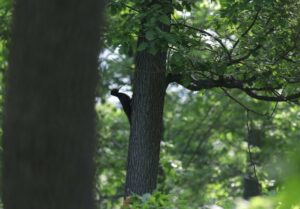Еxperts from WWF and partners have started a procedure for monitoring biodiversity in forests threatened by climate change. The monitoring will last for several years and includes the observation of various animal species, mainly birds, bats and insects. The forest sites where the field work is carried out are carefully selected by WWF and Southwestern State Forestry Enterprise experts, according to specific criteria, taking into account factors such as climate, type and density of the forest, geographical location, etc.
Biodiversity monitoring is part of the measures for adaptation to climate change of one of the most vulnerable forests in our country – the pine plantations. The measures also include the carrying out of thinnings in Scots pine (Pinus sylvestris) plantations, which are already largely affected by various natural disturbances. Many of these forests have been artificially created in atypical locations and this, along with climate change, are among the main reasons why they are increasingly falling victim to damage and drying out. The thinnings will also support the development of natural tree species which are more resistant to climate changes.
Biodiversity in the selected sites will be studied, both in places where adaptation measures will be applied, and in forests where logging activities will not be carried out, and it is important to do this before and after the planned felling. In this way, it will be established in a scientific way whether targeted human intervention has a positive or negative impact on the species of conservation value in the forests. WWF’s big goal is to achieve a positive impact on animals and their habitats, turning artificial forests into natural ones, thus ensuring greater resilience of ecosystems to climate change.
“A forest is not just a collection of trees. It is a complete organism whose parts are inextricably linked and interact at different levels. In this sense, the presence of biological diversity is extremely important for the sustainability of forests. Especially in the rapidly changing climate. Biodiversity is also a key indicator that the forest develops in a balanced way and is able to effectively provide its ecosystem services, which in practice make our life on Earth possible”, says Kostadin Valchev, senior expert “Forests” at WWF.
WWF experts conducted monitoring in two of the selected sites: an artificial Scots pine forest, which will soon be logged, and a natural beech forest, which will serve as a reference and in which logging will not take place. They are located at about 1,000 m above sea level within the Southwestern State Forestry Enterprise. After the accumulation of empirical material, the results in naturally developing forests and those managed by man will be compared, and expert analysis will show the best model to counteract the effects of the climate crisis.
Monitoring technology
In bird monitoring, target species are recorded visually or aurally along pre-selected transects. Experts listen to the sounds the birds make and then map their species, sex, number, behavior and location into specialized software. Since at this time of the year the birds sing most intensively until about 10 am, it is best to start monitoring as early as sunrise. In addition, study participants are expected to walk as quietly as possible and talk in whispers so as not to disturb the birds. Along the transects, dead wood is checked for the presence of rare and conservation-important insect species, and bats are soon to be surveyed.
During the monitoring in the two forests, the experts found the presence of a variety of birds such as: Common finch (F. coelebs) , Cuckoo,(C. canorus), Common Chiffchaff (P. collybita), Great-spotted woodpecker (D. major), Common redstart(P. phoenicurus) , Spotted flycatcher (Muscicapa striata), Common wood pigeon(C. palumbus), Eurasian sparrowhawk (A. nisus), Gray-headed woodpecker(P. canus), Willow tit (P. montanus) and Black woodpecker(D. martius), which is the largest member of the order of the Woodpecker found in our country.
“The science is clear that the presence of insectivorous birds is of utmost importance to the functioning of a healthy and vibrant forest, as it reduces the risk of calamities. In addition, birds, as well as some rodents, play the role of “foresters”, dispersing the seeds of almost all tree species. Crows carry and store large oak and beech seeds, but subsequently may not survive the winter or forget the exact location of their stores. Thus, the seeds have a chance to grow into young trees,” added Valchev.
In an effort to keep the Bulgarian forests healthy and viable, Southwestern State Forestry Enterprise and WWF are working together on the project “Climate-Smart Forest Management in Central and Eastern Europe”, financed under the LIFE program of the European Commission. Field work on the adaptation of forests in our country is carried out on an area of more than 1000 ha within the scope of seven state forestry enterprises.









